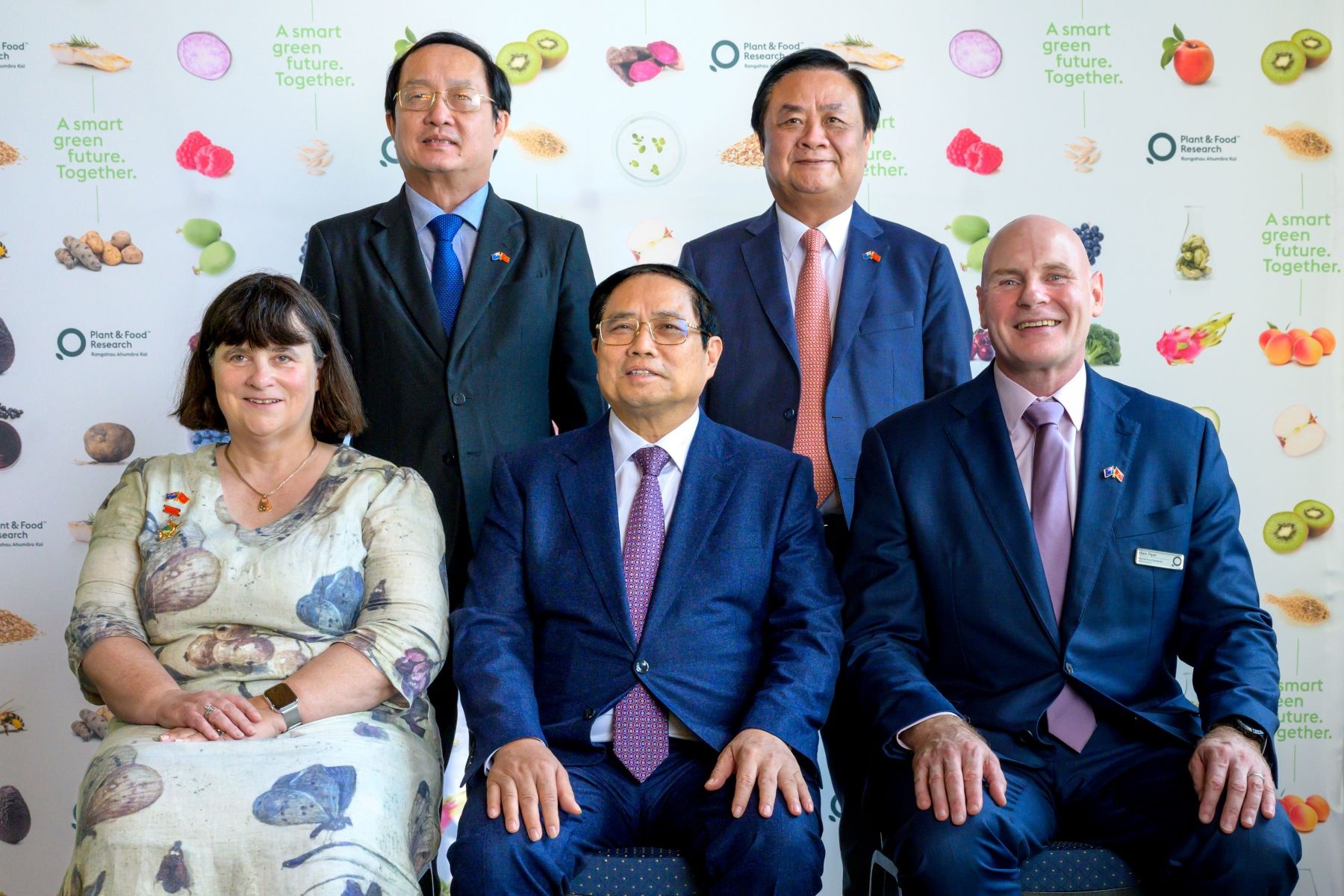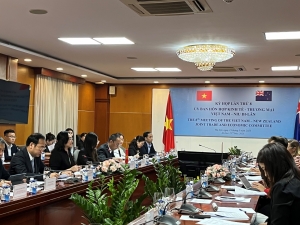New Zealand announces investment in Vietnam’s horticulture sector
 |
| Vietnam's Prime Minister Pham Minh Chinh (centre), Minister of Science & Technology Huynh Thanh Dat (back left) and Minister of Agriculture and Rural Development Le Minh Hoan (back right) with Plant and Food Research CEO Mark Piper (front right) and Suzie Newman, head of International Development (front left) |
New Zealand's Prime Minister Christopher Luxon announced the NZ$6.24 million ($3.85 million) investment in Vietnam’s horticulture sector, called the ‘Vietnam Climate-Smart Fruit Value Chain project’, known as VietFruit.
The project is a key element within New Zealand’s international development cooperation framework with Vietnam. It aims to support the Southeast Asian country’s agricultural sector, build its resilience to climate change and disasters, and help it develop a more highly skilled and educated workforce.
As a member, along with New Zealand, of the Comprehensive and Progressive Agreement for Trans-Pacific Partnership (CPTPP) free trade agreement, Vietnam is becoming increasingly important as a trade partner. For instance, in the year ending June 2023, Vietnam was the second leading export destination for New Zealand apples, after China.
The New Zealand Institute for Plant and Food Research will deliver the VietFruit project, drawing on its decade-long track record of problem-solving and achieving impact through the application of scientific knowledge with Vietnamese partners.
“We have deep partnerships with organisations in Vietnam and have created real value,” said Suzie Newman, head of International Development at Plant and Food Research. “We have worked with smallholder farmers, agronomists, scientists, food companies, exporters and officials at Vietnamese government ministries like Agriculture and Rural Development and Science and Technology."
The VietFruit project has research with two Vietnamese institutes: the Southern Horticulture Research Institute and the Northern Mountainous Agriculture and Forestry Science Institute. Vietnamese firm Nafoods Group is also a commercial partner.
This project aims to deliver three key outcomes, including increasing the productivity and resilience of the passion fruit production system; improving post-harvest and processing technologies and conducting sector-wide training that benefits smallholder farmers and businesses.
Project scoping followed by early implementation began last year. To date, the project’s scientists have assessed disease and climate change impact challenges, begun field trials and conducted initial post-harvest loss assessments along the value chain.
The benefits of success will include increased incomes for smallholder farmers, distributors and exporters, improved fruit quality and more efficient growing and post-harvest practices. Overall, the project will achieve a real lift in environmental and economic sustainability for Vietnam’s passion fruit sector. It’s a high-value export and a valuable addition to the economy of Vietnam.
 | New Zealand seeks to level up wide-ranging trade Along with the traditional trade relationship, New Zealand and Vietnam are fostering cooperation in sectors such as education. New Zealand’s Deputy Secretary of Foreign Affairs and Trade, Vangelis Vitalis, talked to VIR’s Kim Oanh about the potential of bilateral cooperation in more areas. |
 | New Zealand and Vietnam agree to boost trade and investment cooperation New Zealand and Vietnam have agreed to increase their trade cooperation and reduce barriers, with the goal of raising bilateral trade turnover to $2 billion by 2024. |
 | New Zealand and Vietnam offering trade solutions The latest meeting of the Vietnam-New Zealand Joint Economic and Trade Committee took place in Hanoi last week, with promises to boost cooperation in trade and reduce trade barriers. New Zealand’s Deputy Secretary of Foreign Affairs and Trade, Vangelis Vitalis, talked to VIR’s Kim Oanh about the potential of bilateral cooperation and proposals to realise trade turnover targets. |
What the stars mean:
★ Poor ★ ★ Promising ★★★ Good ★★★★ Very good ★★★★★ Exceptional
Related Contents
Latest News
More News
- SHIFT project launched to steer capital towards green growth (January 28, 2026 | 09:52)
- Haiphong steps up supporting industry ecosystem efforts (January 27, 2026 | 16:09)
- Century Synthetic Fibre inaugurates Unitex factory in Tay Ninh (January 26, 2026 | 16:03)
- SLP supporting Vietnam in closing FDI-related gaps (January 26, 2026 | 10:06)
- UK–Vietnam partnership advances BIM centre for railway development (January 24, 2026 | 11:20)
- Nghe An issues criteria for Quynh Lap LNG plant selection (January 22, 2026 | 20:20)
- Vietnam as a manufacturing hub: why on-the-ground inspection matters (January 22, 2026 | 11:47)
- 14th National Party Congress: Building Hue into distinctive international cultural, tourism hub (January 22, 2026 | 09:27)
- British rail businesses strengthen cooperation in Vietnam (January 21, 2026 | 18:10)
- Vietnamese businesses step up plans for cybersecurity centres (January 21, 2026 | 11:09)

 Tag:
Tag:

















 Mobile Version
Mobile Version